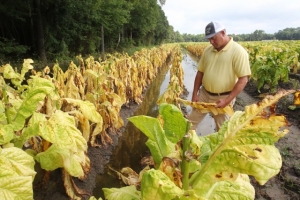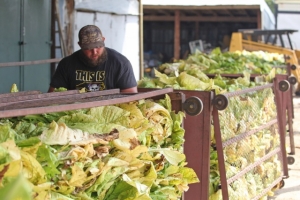Excessive rain presents tobacco crop challenges
By Steve Herring
Published in News on August 23, 2018 5:50 AM

News-Argus/STEVE HERRING
Field crop agent Daryl Anderson checks the leaf quality on a tobacco field near Seven Springs that has been left partly flooded by all of the recent rains.

News-Argus/STEVE HERRING
Jimmy Ward prepares the leaf for barns at his family's farm in the Seven Springs community.
SEVEN SPRINGS -- The ground looks wet, but firm.
It isn't.
As soon as Wayne County Extension field crop agent Daryl Anderson steps onto the tobacco field, his boots are sucked into the mud. He has to struggle to pull his feet free.
The morass is keeping tobacco harvesters out of the fields countywide, forcing farmers, in some cases, to harvest the leaf by hand -- a more labor-intensive and costly job.
The incessant rains over the past month have done more than leave fields countywide a muddy mess. They have spawned disease such as Granville wilt and have caused leaves to ripen all at once, instead of in stages.
That, in turn, has placed a premium on tobacco barn space as farmers rush to get the crop in.
Some places in Wayne County have had between 10 and 20 inches of rain, Anderson said. It is a problem across eastern North Carolina, he said.
"I said the last time that it (leaves) would come off quick or we would hope that we didn't get to the frost (before finishing the harvest)," Anderson said. "But it is coming off quick because it has kept raining. The two problems right now are getting in the fields to get it out and then the next problem is barn space.
"A lot of people have resorted to cropping on foot because they can't get their machines in the fields. They are trying to get in the field on foot so they can get the crop out before they lose it."
At the same time, farmers are trying to keep the diseased leaf out and leave it in the field.
Many fields have only been cropped once, and there is an option in which farmers spray the crop with a ripening agent and harvest it all at once and get it in the barn in order to save the crop.
However, tobacco companies want the different level on the stalk to be cropped at different times because the grades are different depending on whether it is bottom, middle or tips, Anderson said.
Mixing the levels could hurt the grades and impact what farmers are paid, Ward said.
"If it keeps on raining, it will be worse because it is not going to hold on but for another three or four weeks at the most," he said. "I would dare say that within three to four weeks, most of the tobacco crop is going to be out of the field."
Normally, some farmers are still putting in tobacco in early October.
"I had a farmer tell me Monday that he was two weeks behind in putting in tobacco," Anderson said. "He was a big farmer, and that means he was 170 barns behind last year."
Earlier, dry conditions kept the crop from filling out, and then it rained and the crop filled out and turned green and couldn't be cropped, he said.
"I mean, now they are putting in as best they can," Anderson said. "Some of these guys are having to go whether it is wet, green or what.
"If they can get in the field, they are putting it in the barn, if they have barns. That is not the way they want to do it. If it falls off on the ground, it's gone."
Jack Ward of the Seven Springs community is among the farmers who have parked their harvesters until the fields dry out.
One of his fields has standing water.
"The issue with the rain is when you can't spray, of course, suckers (secondary stems from the base or leaf axil) are a problem," he said. "Weeds are a problem. We are beginning to have all kinds of problems due to this excessive rain.
"I'll be honest with you, I don't know which way to turn, but we are going at it as hard as we can and try to save what we can."
Ward, who farms 90 acres, said the crop had too much water to start with when it was transplanted. Then it went through about four or five weeks of hot and dry weather conditions.
"Now I believe we are over 20 inches of rain in the last six weeks," he said. "That makes things almost impossible. The tobacco is drowning.
"The fields are so wet you can't get in to spray. You can't get in to crop. We are just kind of handicapped right now. The machines will not go in places."
It is still too early to predict the economic impact the rain will have, Ward said.
"I tell people this may be the old farmer's way, but it is like a 4-year-old on a hot summer day with a cone of ice cream," Ward said. "It's just melting away, going away. He's got it all over him, and there ain't but so much that he can do with it.
"From an economic standpoint, it is going to be a whole other ballgame. We are just not going to have our poundage, too much of it has drowned, and it just seems like we started out bad, and it has gotten worse."
The leaves are yellowing all the way up the stalk, and Ward is cropping what can be salvaged.
"Machines won't go down in the water," he said. "People don't want to, and I don't expect them to. So we are just having to leave out some spots and try to save the majority."
Ward said the question is whether they will be able to keep the different levels of leaves separate.
He thinks he may wind up with some mixed where, if conditions had been favorable, they would not be.
"Different fields are going to be different ways," he said. "I mean we are at such a point now that it has already been cropped twice. So what we have got left, some of it I was going to get it in one more time anyway, but now it is forcing my hand, so I will just have to do the best that I can.
Ward has nine barns and has rented two more -- it will not be enough to handle so much of the crop coming off the stalk at one time.
"At this time of the year, I don't know if you can have enough (barn space) or not," he said. "But we are doing everything that we can to save every leaf that we can. You don't go nowhere where you don't have a barn full. You are like, good Lord I ain't gone nowhere.
"That is what I meant by forcing my hand -- making me do things that I don't even want to, having to do it in order to save it."
Ward, 60, has been farming since he was 18.
He recalls one time in the 1960s when conditions were similar -- other than in a hurricane.
"We've actually had more rain in the last month than we had from (Hurricane) Matthew," Ward said. "We got 16 inches in Matthew, and we have already had 21 over a little bit more time, but still we have had that much rainfall."
Every few days, another 3 to 6 inches falls so there is not enough time for the land to dry out, he said.
"I would like to see it dry," Ward said. "Not many times do you hear a farmer say I would like to see it dry out, but I would like to see it dry out now."
